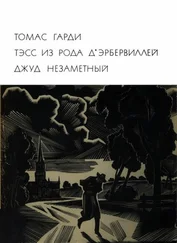| The appeal duly found its way to the breakfast-table of the quiet Vicarage to the westward, in that valley where the air is so soft and the soil so rich that the effort of growth requires but superficial aid by comparison with the tillage at Flintcomb-Ash, and where to Tess the human world seemed so different (though it was much the same). |
Послание было своевременно доставлено к завтраку в тихий дом священника на западе той долины, где воздух такой мягкий, а земля такая тучная, что возделывание полей не требует тяжких усилий, как в Флинтком-Эше, и где даже люди, по мнению Тэсс, принадлежат к какой-то иной породе (хотя в действительности они везде одинаковы). |
| It was purely for security that she had been requested by Angel to send her communications through his father, whom he kept pretty well informed of his changing addresses in the country he had gone to exploit for himself with a heavy heart. |
Заботясь о том, чтобы письма не пропадали, Энджел посоветовал Тэсс писать на имя отца, которого не забывал уведомлять о перемене своего адреса в той стране, куда с тяжелым сердцем отправился на разведку. |
| "Now," said old Mr Clare to his wife, when he had read the envelope, "if Angel proposes leaving Rio for a visit home at the end of next month, as he told us that he hoped to do, I think this may hasten his plans; for I believe it to be from his wife." |
- Ну вот, - сказал старый мистер Клэр жене, прочтя адрес на конверте, - если Энджел в конце будущего месяца намеревается, как он нам писал, покинуть Рио и посетить родину, то это письмо, пожалуй, ускорит его отъезд; мне кажется оно от его жены. |
| He breathed deeply at the thought of her; and the letter was redirected to be promptly sent on to Angel. |
Он глубоко вздохнул, и письмо было тотчас переадресовано Энджелу. |
| "Dear fellow, I hope he will get home safely," murmured Mrs Clare. |
- Милый мой мальчик! Надеюсь, он благополучно вернется домой, - прошептала миссис Клэр. |
| "To my dying day I shall feel that he has been ill-used. |
- До конца жизни я буду считать, что мы были к нему несправедливы. |
| You should have sent him to Cambridge in spite of his want of faith and given him the same chance as the other boys had. |
Ты должен был бы послать его в Кембридж, несмотря на его неверие, и дать ему такое же образование, какое получили старшие братья. |
| He would have grown out of it under proper influence, and perhaps would have taken Orders after all. |
При благотворном влиянии он изменил бы свои взгляды и, быть может, в конце концов принял сан. |
| Church or no Church, it would have been fairer to him." |
И во всяком случае это было бы справедливее по отношению к нему. |
| This was the only wail with which Mrs Clare ever disturbed her husband's peace in respect to their sons. |
Это был единственный упрек в отношении их сыновей, который миссис Клэр позволяла себе делать мужу. |
| And she did not vent this often; for she was as considerate as she was devout, and knew that his mind too was troubled by doubts as to his justice in this matter. |
Да и этот упрек повторяла она нечасто, так как была женщиной не только благочестивой, но и мягкой. Она знала, что и его тревожат сомнения, справедливо ли он поступил в данном случае. |
| Only too often had she heard him lying awake at night, stifling sighs for Angel with prayers. |
Частенько слышала она, как в часы бессонницы он, сдерживая вздохи, молится об Энджеле. |
| But the uncompromising Evangelical did not even now hold that he would have been justified in giving his son, an unbeliever, the same academic advantages that he had given to the two others, when it was possible, if not probable, that those very advantages might have been used to decry the doctrines which he had made it his life's mission and desire to propagate, and the mission of his ordained sons likewise. |
Впрочем, непреклонный евангелист и теперь считал, что не вправе был дать своему неверующему сыну то же академическое образование, какое получили его братья, - вполне возможно и даже весьма вероятно, что Энджел использовал бы свои познания для опровержения тех самых доктрин, служение которым его отец сделал целью своей жизни и жизни своих старших сыновей. |
| To put with one hand a pedestal under the feet of the two faithful ones, and with the other to exalt the unfaithful by the same artificial means, he deemed to be alike inconsistent with his convictions, his position, and his hopes. |
Возводить одной рукой пьедестал для двух верующих, а другой - для неверующего казалось ему поступком, не соответствующим его убеждениям, положению и надеждам. |
| Nevertheless, he loved his misnamed Angel, and in secret mourned over this treatment of him as Abraham might have mourned over the doomed Isaac while they went up the hill together. |
Тем не менее он любил своего сына, столь неудачно названного Энджелом, и втайне сокрушался по поводу своего решения в отношении сына, подобно тому как сокрушался Авраам, поднимаясь с обреченным Исааком на гору. |
| His silent self-generated regrets were far bitterer than the reproaches which his wife rendered audible. |
И немая его скорбь была мучительнее тех упреков, какие приходилось ему слышать от жены. |
| They blamed themselves for this unlucky marriage. |
Они считали себя виновниками этого неудачного брака. |
| If Angel had never been destined for a farmer he would never have been thrown with agricultural girls. |
Если бы Энджелу не суждено было стать фермером, он не общался бы с деревенскими девушками. |
| They did not distinctly know what had separated him and his wife, nor the date on which the separation had taken place. |
Они не знали, что именно привело его к разрыву с женой, и не знали, когда произошел этот разрыв. |
| At first they had supposed it must be something of the nature of a serious aversion. |
Сначала они предполагали, что он вызван какой-то непреодолимой неприязнью. |
| But in his later letters he occasionally alluded to the intention of coming home to fetch her; from which expressions they hoped the division might not owe its origin to anything so hopelessly permanent as that. |
Но в последних письмах Энджел вскользь упоминал о том, что собирается приехать за ней и увезти с собой; теперь они начали надеяться, что разрыв между ними вызван обстоятельствами, которые в конце концов можно устранить. |
| He had told them that she was with her relatives, and in their doubts they had decided not to intrude into a situation which they knew no way of bettering. |
Он им сказал, что она живет со своими родными, и, теряясь в догадках, они решили не вмешиваться в отношения, которых не могли изменить к лучшему. |
| The eyes for which Tess's letter was intended were gazing at this time on a limitless expanse of country from the back of a mule which was bearing him from the interior of the South-American Continent towards the coast. |
Тот, кому адресовано было письмо Тэсс созерцал в это время бесконечные равнины со спины мула, который вез его из центральных областей Южной Америки к побережью. |
| His experiences of this strange land had been sad. |
В этой чужой стране Энджелу не повезло. |

![Томас Вулф - Взгляни на дом свой, ангел [английский и русский параллельные тексты]](/books/32195/tomas-vulf-vzglyani-na-dom-svoj-angel-anglijskij-thumb.webp)
![Агата Кристи - На краю [английский и русский параллельные тексты]](/books/32247/agata-kristi-na-krayu-anglijskij-i-russkij-paralle-thumb.webp)
![Сакс Ромер - Ведьмино отродье [английский и русский параллельные тексты]](/books/33237/saks-romer-vedmino-otrode-anglijskij-i-russkij-thumb.webp)
![Агата Кристи - Объявлено убийство [английский и русский параллельные тексты]](/books/33247/agata-kristi-obyavleno-ubijstvo-anglijskij-i-russ-thumb.webp)
![Фрэнсис Фицджеральд - По эту сторону рая [английский и русский параллельные тексты]](/books/34130/frensis-ficdzherald-po-etu-storonu-raya-anglijskij-thumb.webp)

